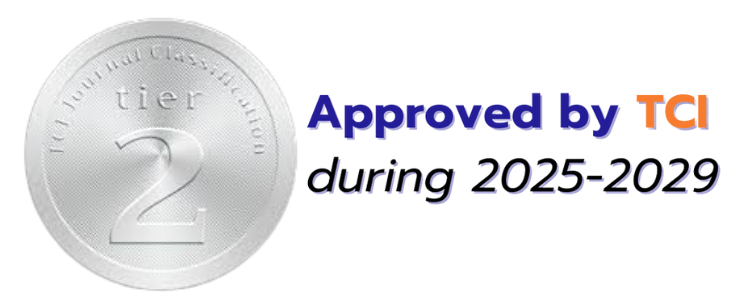ผลของการจัดการเรียนรู้พลศึกษาแบบเพื่อนช่วยเพื่อนที่มีต่อทักษะการส่งลูกในรายวิชาแบดมินตันสำหรับนักเรียนมัธยมศึกษาตอนปลาย|
Effect of Physical Education Learning Management with Peer-to-Peer on Serve Skills in Badminton Course of Upper Secondary School Students
คำสำคัญ:
การจัดการเรียนรู้พลศึกษา, เพื่อนช่วยเพื่อน, ทักษะการส่งลูกแบดมินตัน, นักเรียนมัธยมศึกษาตอนปลาย, Physical Education Learning Management, Peer-to-Peer, Serve skills, Secondary school studentsบทคัดย่อ
การวิจัยครั้งนี้เป็นการวิจัยกึ่งทดลองเพื่อศึกษาผลของการจัดการเรียนรู้พลศึกษาแบบเพื่อนช่วยเพื่อนที่มีต่อทักษะการส่งลูกแบดมินตันของนักเรียนมัธยมศึกษาตอนปลาย และเปรียบเทียบผลของการจัดการเรียนรู้พลศึกษาแบบเพื่อนช่วยเพื่อนกับแบบปกติที่มีต่อทักษะการส่งลูกแบดมินตัน กลุ่มตัวอย่างคือนักเรียนมัธยมศึกษาปีที่ 4 โรงเรียนบ้านสวน (จั่นอนุสรณ์) ปีการศึกษา 2565 จำนวน 84 คน ผู้วิจัยใช้วิธีการเลือกแบบเจาะจง จำนวน 2 ห้องเรียน ที่มีค่าเฉลี่ยของทักษะการส่งลูกใกล้เคียงกันเป็นกลุ่มตัวอย่าง แบ่งเป็นกลุ่มทดลอง 42 คน ได้รับการจัดการเรียนรู้พลศึกษาแบบเพื่อนช่วยเพื่อน กลุ่มควบคุม 42 คน ได้รับการจัดการเรียนรู้พลศึกษาแบบปกติ เครื่องมือที่ใช้ ได้แก่ แผนการจัดการเรียนรู้พลศึกษาแบบเพื่อนช่วยเพื่อนและแบบปกติ มีค่าดัชนีความสอดคล้อง (IOC) เท่ากับ 0.84 สื่อวิดิทัศน์ มีค่าดัชนีความสอดคล้อง (IOC) เท่ากับ 0.91 แบบทดสอบทักษะการส่งลูกประกอบด้วย แบบทดสอบทักษะการส่งลูกยาวหน้ามือ มีค่าดัชนีความสอดคล้อง (IOC) เท่ากับ 0.84 และมีประสิทธิภาพ () เท่ากับ 78.13/76.83 และแบบทดสอบทักษะการส่งลูกสั้นหลังมือ มีค่าดัชนีความสอดคล้อง (IOC) เท่ากับ 0.92 และมีประสิทธิภาพ () เท่ากับ 76.02/77.64 นำข้อมูลที่ได้มาวิเคราะห์ผลทางสถิติ หาค่าเฉลี่ย ส่วนเบี่ยงเบนมาตรฐาน และทดสอบสมมติฐานด้วยสถิติค่าที
ผลการวิจัยพบว่า (1) กลุ่มทดลองที่ได้รับการจัดการเรียนรู้พลศึกษาแบบเพื่อนช่วยเพื่อนหลังการทดลอง มีทักษะการส่งลูกดีกว่าก่อนการทดลองอย่างมีนัยสำคัญทางสถิติที่ระดับ .05 (2) กลุ่มควบคุมที่ได้รับการจัดการเรียนรู้พลศึกษาแบบปกติหลังการทดลอง มีทักษะการส่งลูกดีกว่าก่อนการทดลองอย่างมีนัยสำคัญทางสถิติที่ระดับ .05 (3) หลังการทดลอง กลุ่มทดลองที่ได้รับการจัดการเรียนรู้พลศึกษาแบบเพื่อนช่วยเพื่อนมีทักษะการส่งลูกดีกว่ากลุ่มควบคุมที่ได้รับการจัดการเรียนรู้พลศึกษาแบบปกติอย่างมีนัยสำคัญทางสถิติที่ระดับ .05 ส่วนก่อนการทดลองไม่แตกต่างกัน และ (4) ความพึงพอใจของกลุ่มทดลองที่มีต่อการจัดการเรียนรู้พลศึกษาแบบเพื่อนช่วยเพื่อนโดยรวม อยู่ในระดับมาก(ค่าเฉลี่ย=4.45)
The purposes of this research were; 1) to study the effect of physical education learning management with peer-to-peer on serve skills in badminton course of upper secondary school students and 2) to compare of the effect of peer-to-peer physical education learning management with a conventional instruction on serve skills in badminton course of upper secondary school students.The samples group were students in Mathayomsuksa 4 at Bansuan Jananusorn School, the first semester of the academic year 2022 was 84 people.The researcher used a purposive sampling method for 2 classrooms with similar averages of delivery skills as a sample group and divided into an experimental group of 42 subjects who received peer-to-peer physical education management. The control group, 42 subjects, received conventional instruction learning management. The research instrument for this research included; lesson plan in physical education management with peer-to-peer and normal with an index of item objective congruence of 0.84, video media with an index of item objective congruence of 0.91, serve skills test include; 1) forehand long serve test with an index of item objective congruence of 0.84 and the effectiveness of 78.13/76.83 2) backhand short serve test with a reliability of 0.92 and the effectiveness of 76.02/77.64.The data were analyzed to find the mean, standard deviation and t-test.
The research findings were as follows; 1) the experimental group who received of physical education learning management with peer-to-peer after the 8 week had better on serve skills than before the experiment at significant level of 0.05 2) the control group who received of physical education learning management with normal after the 8 week had better on serve skills than before the experiment at significant level of 0.05 3) after the 8 week of experiment, the experimental group had better on serve skills than the control group at significant level of 0.05, the pre-test was no different and 4) the experimental group had a mean score of satisfaction with of physical education learning management with peer-to-peer after the experiment was 4.45 at a high level.







